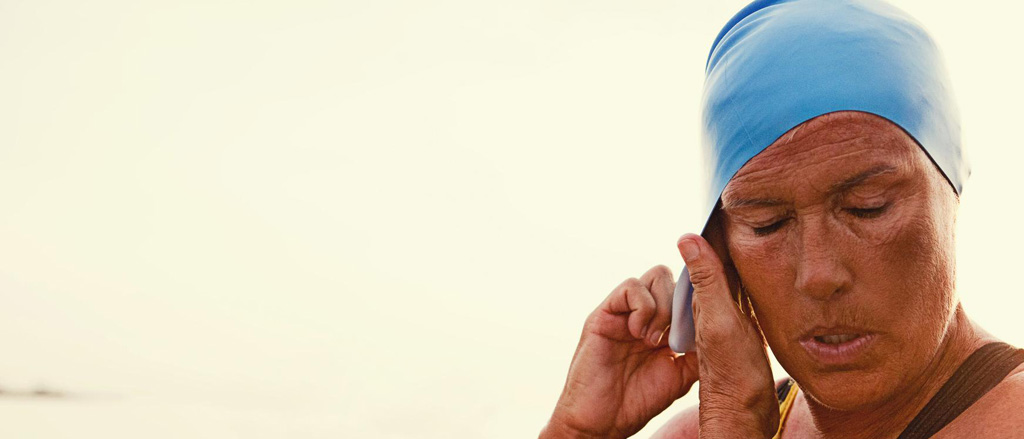One of the more revealing moments in “The Other Shore” is when long-distance swimmer Diana Nyad’s trainer and best friend Bonnie Stoll recalls watching Nyad “walking onto ‘The Tonight Show’ like it was her show” before a clip runs of Nyad playfully teasing Johnny Carson, clearly unintimidated by the King of Late Night or being in front of a national audience.
Seeing Nyad thirty years later, it’s obvious little has changed, except for the fact that she no longer swims, having given up marathon swims after a failed trek from Cuba to Florida in 1978 for a career in broadcasting for ABC’s Wide World of Sports. Though the broad shoulders that once carried her all the way around Manhattan Island have thickened slightly since last diving in the water, Nyad’s determination hasn’t flagged, with the spigot she was so readily able to turn off upon deciding her swimming days were done in order to move forward with her life once again turned on at the age of 62 when she’s “pissed off” enough at most folks’ perception of age, including her own to a certain degree, to try the transatlantic swim one more time. There’s an unspoken financial incentive here, as such a swim will likely provide ample material for the TED Talks and other motivational speeches at corporate events she’s asked to give, but in providing a welcome break from them for Nyad, it also uniquely pits her against aging – not of getting older, but the possibility of enduring something she physically wasn’t able to when she was younger.
“The Other Shore” threatens to be one of those blandly inspirational addresses you would hear at a corporate event since the first half of the film is largely consumed with Nyad directly addressing the camera and the same resiliency that makes her such an incredible force to be reckoned with in the water is also what makes her nearly impenetrable as a subject for a documentary. Although she’s gregarious and will segue without hesitation into imitating the voice of her Greek father while telling a story, Nyad also has a rehearsed quality that’s less effective onscreen than it likely is in the room, putting the audience at a distance, even as she’s recounting some particularly devastating personal revelations. Because director Timothy Wheeler relies on her voice almost exclusively in the early going, if you were already aware of Nyad’s well-publicized comeback or simply hoping for an unscripted moment in this underdog tale, “The Other Shore” doesn’t offer much at the beginning but a highlight reel of Nyad’s myriad accomplishments and a vague sense of where she got her drive from.
Yet two things happen to liven up “The Other Shore,” the first obviously being the remarkable history that unfolds before Wheeler’s camera directly of Nyad’s death-defying Havana-to-Key-West swims where she isn’t only attempting to log over a hundred miles in the ocean, but to do so with the ever-present threat of sharks and poisonous jellyfish. The second and more unexpectedly compelling element comes in the introduction of the aforementioned Stoll, a former racquetball pro who, while sharing a mental and physical toughness with Nyad, isn’t encumbered by protecting a well-developed public persona and puts a human face of Nyad’s superhuman efforts.
Once “The Other Shore” kicks into this second gear, it never looks back, charting Nyad’s efforts with both a sharp sense of pacing and a considerable amount of skill in conveying how difficult it is to achieve what Nyad is attempting without drowning out the action, which there is plenty of. As Stoll says at one point during one of Nyad’s early 28-mile practice swims, tears curling up at the corners of her eyes, “Seeing anybody do what they do best is beautiful.” No doubt there will be many who feel the same about “The Other Shore.”
“The Other Shore” doesn’t have U.S. distribution. It will soon play Hot Docs in Toronto on May 2nd, 3rd and 5th.




